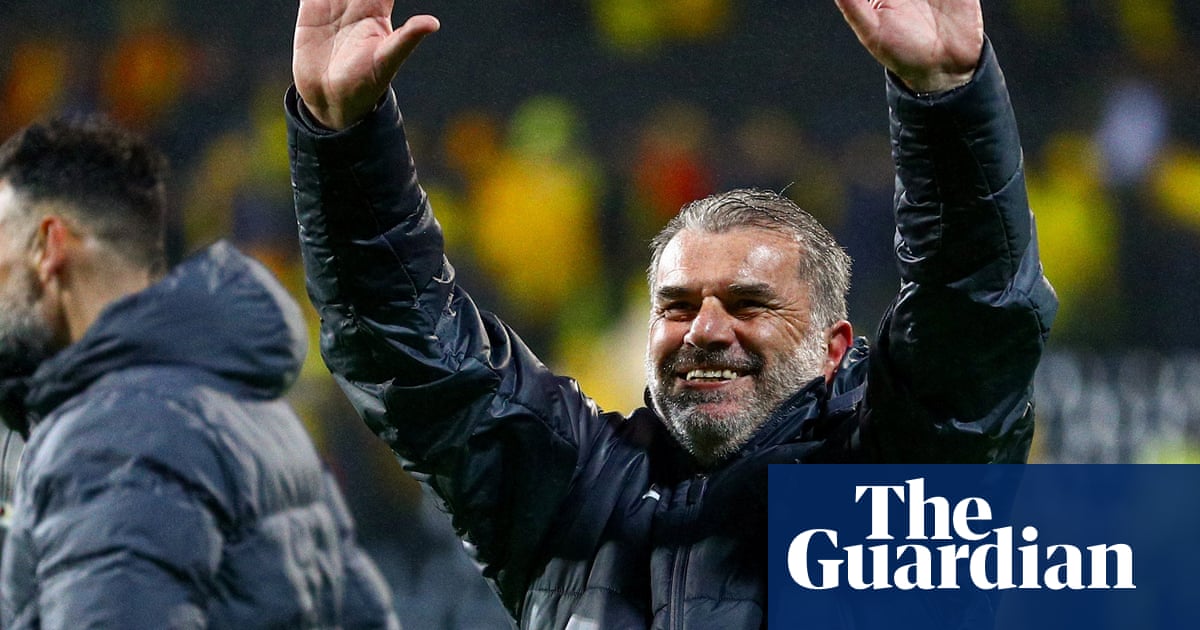Take the emotion out of it. It is easier said than done.Tottenham Hotspurare not in the business of hoarding silverware and there will be a temptation to stick with Ange Postecoglou if they beat Manchester United in the Europa League final. The pressure on Daniel Levy to give Postecoglou another chance would be intense. It is not hard to see which way a chair with a history of populist moves would go.
Yet there is rarely much to gain from the impulsiveness of judging a manager on the basis of a one-off game that could be won on penalties or with a lucky late goal. The obvious cautionary tale is provided by United keeping Erik ten Hag after last season’s triumph in the FA Cup, only for the Dutchman to be sacked five months later. Serious clubs are supposed to be clinical. The mistake is often to look for wider meaning in a weird and illogical cup run.
Look at Chelsea. Would they have been right to give Avram Grant another season if John Terry had scored his penalty in the Champions League final in 2008? Obviously not. Four years later, though, Chelsea were swept away by the romance of becoming European champions after appointing Roberto Di Matteo as caretaker manager. Giving Di Matteo the job on a permanent basis was a mistake. It was not a surprisewhen he was sackedthree months into the following season. There are also parallels with David Moyes leaving West Ham a year after guiding them to Conference League glory. It was West Ham’sfirst trophy in 43 yearsbut it did not stop supporters grumbling about Moyes’s tactics and their team’s uneven league form.
Maintaining a sense of perspective is the challenge. Juande Ramos was the last Spurs manager to lift a trophy butbeating Chelsea in the 2008 League Cup finalwas not the start of a dynasty. Ramos was gone before the turn of the year. Tottenham acted quickly after a disastrous start to the 2008-09 campaign. Any outrage at Ramos’s treatment was forgotten when the Spaniard’s replacement, Harry Redknapp, led the club into the Champions League 18 months later.
Yet there will be a case for Levy to give Postecoglou another chance if the Australian wins the club’s first trophy in 17 years. It would be a major achievement. Spurs are the lovable losers. They play nice football but wilt under pressure. The smart money is on United overcoming their awfulness and tapping into their greater knowhow in the final. Spurs cannot match that experience. The challenge for Postecoglou is as much mental as tactical; he has to ensure that his players are not overcome by the size of the occasion. Do that and letting him go would feel harsh.
Equally Spurs have to calculate whether success in Europe would demonstrate that Postecoglou is capable of succeeding in English football. An uncomfortable reality for Uefa is that the financial dominance of the Premier League is starting to tell in theEuropa Leagueand Conference League.
For all their domestic struggles, Spurs and United reaching the final is a predictable turn of events. Spurs are richer than every team they have faced in the knockout phase. They saw off AZ in the last 16, recovering from a first-leg defeat tobeat the sixth-best side in the Eredivisie. Eintracht Frankfurt, their quarter-final opponents, sold their star forward Omar Marmoush to Manchester City in January and are third in a mundane Bundesliga. A semi-final against the first Norwegian side to go this deep in Europe was even more inviting.
Where Postecoglou deserves credit is in how he has adapted his tactics in this competition. He put pragmatism over principles in the second leg against Frankfurt, ensuring that Tottenhamwon a gamemany expected them to lose, and a direct approach proved similarly effective against Bodø/Glimt. Spurs were calm, professional and deserving of their 2-0 win on the plastic pitch at the Aspmyra Stadium on Thursday.
Yet that flexibility has rarely been seen in the Premier League. Spurs have been chaotic at the back and careless with leads. Nineteen defeats says it all. Postecoglou finished fifth last season but a strong start to the campaign papered over a lot of cracks. It is hard to overlook how bad the league form has been since November 2023.
Injuries have been a factor this season. Then again Spurs were not convincing when everyone was available at the start of the campaign. The pressure grew when theysquandered a 2-0 leadagainst Brighton in October. They were close to full strength when they lost at home to Ipswich. There have also been suggestions that Postecoglou’s gung-ho style has contributed to the fitness issues. It is unclear whether Spurs’ cautious approach to recruitment under Levy can cope with the physical demands of Postecoglou’s system. The strain will increase if they are in the Champions League next season.
Spurs need to be decisive. They need to act if they conclude that a more suitable manager is out there. The physical and technical advantages they enjoy in Europe are not as pronounced in the Premier League. There is also the question of whetherPostecoglou’s relationship with supportersis salvageable. Fans will not easily forget last month’sear-cupping episodeagainst Chelsea. It adds to the sense that Postecoglou’s best move could be leaving on a high.
